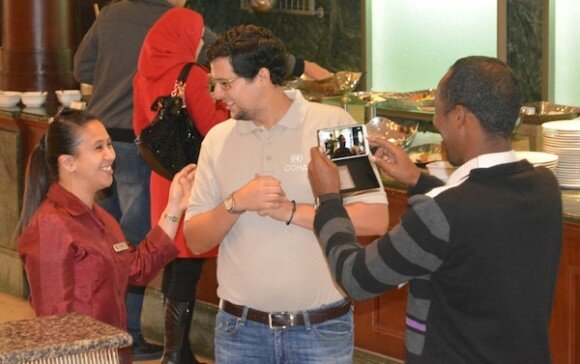
When crises strike, the United Nations Office of Coordination of Humanitarian Affairs (OCHA), is consistently among the first institutions to intervene.. On the scene when violence recently re-ignited in the Central African Republic and immediately responsive to devastation caused by the 2012 typhoon that struck Tacloban in the Philippines, OCHA field officers are among few responding organizations with access to areas affected by crisis. By partnering with Small World News and implementing their StoryMaker app, OCHA field staff leverage their unique access to a world the general public does not know by creating compelling stories no one else is telling and share them with the world. And they can do all of this, needing nothing more than a smartphone.
Recognizing the importance of telling the story of their work from the field, OCHA’s communications office asked Small World News to provide training and mentoring to their Press Information Officers with the objective of empowering them to tell insightful stories from some of the most vulnerable places in the world. An all-in-one solution to creating and publishing stories, StoryMaker users focus on telling and sharing a compelling story with integrated guides, without being hampered by technical issues. Simple to learn and navigate, StoryMaker scales external communications objectives while supporting the generation of professional deliverables.
The March 2014 program launch transpired in Jordan and included twenty-seven OCHA field officers as well as their headquarters communications team. Equipped with varying degrees of experience in communications and public relations, trainees participated in an accelerated Small World News course in visual storytelling with a smartphone and the StoryMaker app. Despite the unusually brief convening for Phase One of this curriculum, trainees personally experienced great success in both learning the introductory curriculum and realizing the potential of this tool. Actively using StoryMaker throughout the program, trainees recognized diversity amongst their peers as they individually produced stories. These exercises aided in building camaraderie, compassion, and trust among participants allowing them to experience first-hand what information sharing can deliver for a large population of readers.
The trainees worked hard and came up with a fascinating array of interesting stories, from silly to saddening. While the approach varied greatly amongst participants, a number of themes were dominant, reflecting the similarities across much of UNOCHA’s work, despite offices and projects spanning the globe. Three stories, in particular, stood out.
In one case, two participants produced a story focusing on the impact of unemployment and interviewed a man working at the hotel as a chef. It was discovered that he had earned a master’s degree in computer science. Although there is a lack of jobs in that field, he found work as a chef at the hotel and doubles up by providing the IT support to the hotel.
Another group addressed the issue of orphans who have lost family due to tragedy. They made a humorous piece profiling three young cats the hotel has taken an affinity with. Their story profiled the cats struggle to find a place to live, in the face of opposition from hotel guests leading to their displacement.
Finally, the third group, who produced the best overall piece, was a fictional look at a woman displaced by a natural disaster. Although each of the individuals in the piece was acting, the combination of script and well-constructed visuals resulted in the creation of a story that provided each trainee a strong example of what they should try to produce during Phase Two of our program.
As Phase Two begins, Small World News will work closely with program trainees, OCHA field officers, back at their offices across the world. The continued curriculum includes Small World News advising them on choosing shots, interviewing ideal individuals, and coaching them through any technical difficulties they encounter. Sustained collaboration and mentoring will enrich their confidence in using StoryMaker and ensure overall program success for both OCHA and Small World News.
Small World News is looking forward to nurturing a relationship with OCHA. Sharing stories from refugees and people displaced by natural disasters and conflict will put a human face on some of the worst crises affecting the world today.
Please stay tuned for updates including additional outcomes of this program as their stories come in!
Blog, Featured, Small World News Blog, Small World News Blog